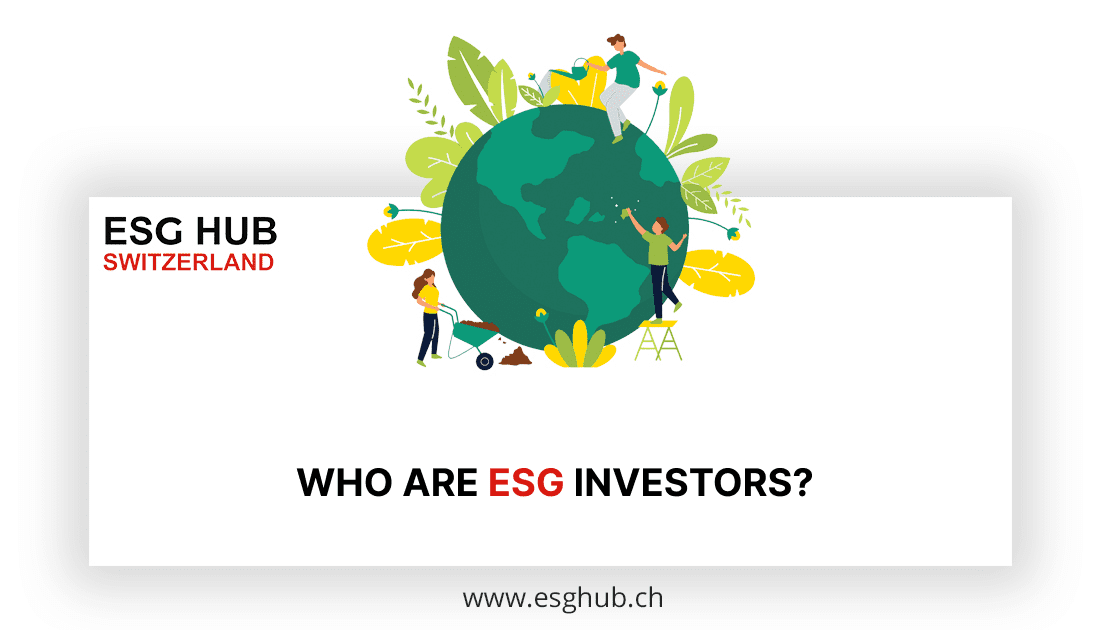Who are ESG investors?
Who are ESG investors?

Environmental, social, and governance (ESG) funds are becoming increasingly popular worldwide. Institutional investors and shareholders are increasingly looking for impact investments. ESG investments help investors reduce risks and improve their investment performance.
ESG represents a more sustainable-focused approach to businesses. According to a Bloomberg recent study, ESG assets will be valued at around US $50 trillion by 2025.
Recently, private and public investors have been gradually incorporating ESG factors into their investment decisions.
Impact investors are prioritizing ESG in their investment decisions. In a recent report, 27% of high-net-worth individuals (i.e. individuals with a net worth of a minimum of USD 1,000,000 in highly liquid assets) said they were interested in sustainable products. It is observed that the wealthier the investor the more likely they are concerned about sustainable investing.
Is it just the wealthy people who invest in ESG?
Well, we can easily see how rapidly ESG investment market is growing.
ESG stands for “environmental, social, and governance,” and represents a more sustainable-centric approach to businesses. According to a recent study, ESG assets will be valued at around 53 trillion by 2025. Private and public investors are gradually aligning their values for the public good. They incorporate ESG factors into their investment decisions. ESG investments also help them reduce risks and improve their investment performance.
But a few years back this was not the case.
ESG pioneers
A few years ago, sustainability was not a mainstream issue.
When Kofi Anan, then General Secretary of the United Nations (UN), first put forward the idea of multinational corporations supporting sustainability in 2004, it was met with a great deal of resistance.
Some business leaders questioned the UN’s role to serve as a platform for the public good. Many human rights advocates argued that the name of the UN might be abused to enhance the image of large corporations.
Eventually, a diverse group of business executives, activists, and consultants established the UN Global Compact in 2004 under Kofi Anan’s leadership. The report titled “Who Cares Wins: Connecting Financial Markets to a Changing World”, one of the first outcomes of Global Compact meetings, offered a framework to incorporate environmental, social, and governance issues into business operations.
“Who Cares Wins” was endorsed by some of the largest financial institutions in the world, including Goldman Sachs, Deutsche Bank, and Henderson Global Investors. It paved the way for the Global Reporting Initiative, which in 2014 included sustainability reports from 6,000+ public and private organisations worldwide.
From 2004 to the present day, many organizations have invested in incorporating ESG into their operations and developed ESG strategies.
Is it only the wealthy who are the ESG pioneers?
Impact investors prioritise ESG in their investment decisions. Initially, ESG investors were mostly wealthy individuals or large companies who set the agenda. For example, in a recent report, 27% of high net-worth individuals (i.e., individuals with a net worth of over US $1 million in highly liquid assets) said they were interested in sustainable products. But, as sustainability became more critical to the healthy functioning of the global economy, an increasing number of smaller investors have been investing in ESG.
ESG is also becoming a popular stream of investment for millennial investors who are seeking high returns on investment areas that match their own lifestyles. Last year, millennials contributed US $69.2 billion to sustainable funds, up from less than US $5 billion in 2015. Nearly 40% of Gen Z say their investment decisions are influenced by companies that focus on social and/or environmental causes.
According to a recent study, 67% of millennials believe that ESG investing is a way to express social, political, and environmental values, compared to 36% of baby boomers. It is expected that 90% of young investors will build portfolios that are largely aligned with responsible investments.
While the world’s largest corporations are investing in ESG, SMEs—which all together account for 90% of global firms, 70% of global employment, and 52% of global revenue— are joining the ESG journey, too.
SMEs invest in ESG too
While the world’s largest corporations invest in ESG, SMEs, which altogether account for 90% of global firms, 70% of global employment, and 52% of global revenue – are joining the ESG journey too.
Conclusion
Businesses of all sizes are incorporating ESG strategies into their operations. They are also adapting to changing regulatory requirements and stakeholder demands. They are increasingly aware that incorporating ESG into their business operations is the right way forward for their own organisation, as well as for the environment and society.
Contact us, we are happy to help you at any stage of your sustainability journey.